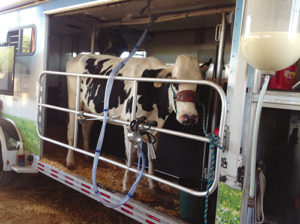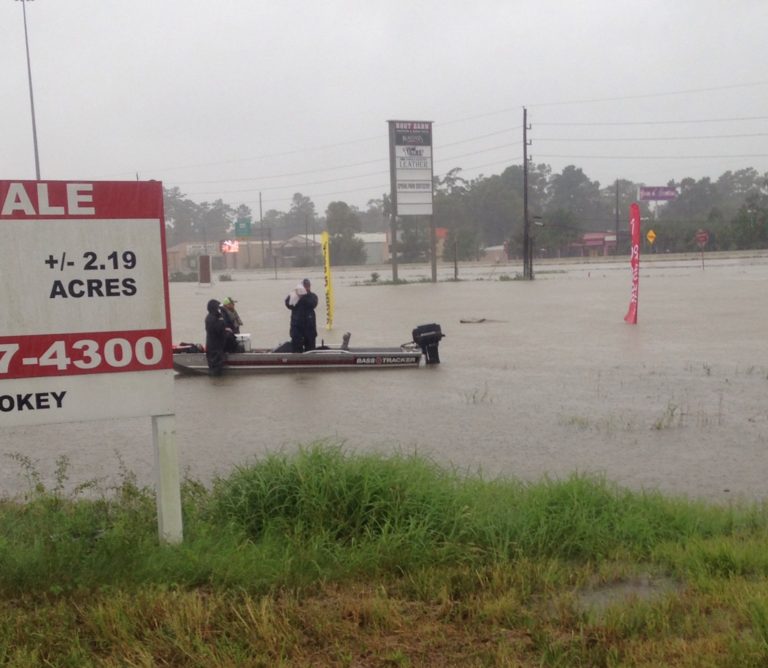Life on the Farm?

Life on the Farm?
By Teresa Holloway
Messenger Reporter
ANDERSON COUNTY – The small American farm may be headed the way of the dinosaur, according to Wall Street numbers and recorded Census results.
Every year, fewer families are part of a self-sustaining and moderately profitable farming venture than ever before and experts are concerned about the future of food production.
Jeffrey Craft, President of the Anderson County Texas Farm Bureau office is one of those concerned, “These days, kids don’t even know where their food comes from,” he said. “We just don’t have the exposure to the food or meat cycle anymore.”
“There are so many of the younger generation who are leaving the farms and going to work in the cities. That leaves less and less people to work the farms,” Croft said.
With the onset of the industrial revolution in the mid-1800s, former farmers and many of their children migrated to cities and towns across the country in search of better lives. The trend continues.
According to the Census, the average age of today’s farmer is 57 years old, and most have no heir willing to take the business into the next generation.
Added to the glitz and glamorous appeal of city life, few people are willing to invest as much as half a million dollars to work 12 to 16 hours per day and live just above the poverty line – but just as few realize how many other opportunities agriculture offers, Croft explained.
“There are so many aspects of agriculture. You can go in as an agriculture lawyer, a legislator … There are certain things agriculture can provide that no other job can – number one, food for the nation,” Croft said.
“Everybody has a ‘steak’ in agriculture,” Texas Farm Bureau State representative Victor Salazar punned.
Competition in municipalities drives costs down, allowing for a better standard of material living than rural areas, but is it really better? Pulitzer winning author and agriculturalist Louis Bromfield called farming, “the only profession in which man deals constantly with all the laws of the universe and life.”
Huge agribusiness corporations pose their own risk to small family farms. With more money making potential because of increased size, big business can put the squeeze on local farmers.
Agribusiness is not just involved in the growing of crops, but the production, storage and distribution as well. As small farms lose ground, according to a Reuter’s article, investment groups and equity firms purchase more and more land.
Giant agribusinesses are an additional factor. Even though 90 percent of all farms are still owned by families or individuals, more and more farms are becoming “corporations.”
These giant agribusinesses are not just involved in local farming, but also in the distribution, processing, storage and retail of farm products nationwide. The result is that milk in a carton now can contain the milk of hundreds of cows. The same can be said of the fast-food burger.
As small family farms are squeezed out of existence, investment groups and equity firms are buying more and more land, according to a Reuters article.
Subsidies, so frequent in today’s agricultural business, may help the overall national economy, but experts warn they can starve the family farm.
Not every group is willing to lie back and watch the grass grow, however. The Texas Farm Bureau has developed a number of ‘grass roots’ projects, plans and long-term developments to aid the family farmer and rancher.
It starts with educational opportunities, Croft said. “We provide scholarship opportunities for seniors who are likely to be in agriculture businesses. It’s not a requirement, though.”
“We promote agriculture through the extension service, help them on different projects. We sponsor meals and different activities.
One of the Croft’s personal favorites, “We have an ‘Ag Day’ for 3rd graders,” he said. “Every 3rd grader in the county comes out and we show them all kinds of agriculturally related things. We talk about feed, how cotton is ginned – we actually have a small cotton gin we demonstrate with.
“More than 700 3rd graders were at last year’s ag day,” he said. “This year, we are going to split the classes in half so each child can spend more time with the exhibits and projects,” Croft laughed.
“Most of our board members are involved in different aspects of agriculture. Some are poultry, cattle, hay operators, some, like myself are involved in more than one.
“We sponsor teacher workshops. One of the things we like to do is adult and kid education when it comes to kid issues.
“Everybody is involved in agriculture. In some form or another, everyone is involved in agriculture,” Croft said.
“One of the other things we do, we try to get any local or statewide ag issues we have recognized by talking to our Congressmen and Representatives. We try to work out issues that could be detrimental to the farmers. We try to figure out laws and policies that could help.
“Water, water rights is one issue. We have some issues with some levees locally, all over the state really because of the flooding. Because several failed, we have tens of thousands of flooded crop and ranch land. That’s something we are working on,” he continued.
The Texas Farm Bureau makes trips to Austin and Washington D.C. to speak to legislatures.
Salazar agreed and added, “The Farm Bureau is here to fight for rural Texas and rural Anderson County. Water issues, tax issues … anything that is going to affect rural citizens, farmers or ranchers … Anderson County Farm Bureau is very active in first, hearing if there is an issue and then doing something about it.”
Senator Nichols, State Representative Byron Cook and Anderson County Judge Robert Johnston have all met with the Farm Bureau to address the levee issues, for example, Salazar said.
One big event, the Youth Leadership Conference, is a major effort by Farm Bureau. “High school age kids go to Tarleton State University every summer. Texas Farm Bureau sponsors that, we help pay the cost of that,” Croft said.
 The Farm Bureau works on levels. The state level hears from the county level who hears from their members. All counties have a board of directors. “The composite makeup of the bureaus are the members – people on the farms and ranches, real grass roots, not an exaggeration,” Croft said.
The Farm Bureau works on levels. The state level hears from the county level who hears from their members. All counties have a board of directors. “The composite makeup of the bureaus are the members – people on the farms and ranches, real grass roots, not an exaggeration,” Croft said.
“What’s unique about Farm Bureau at the state level is anything we do has to come from the county leaders. Any policy stance we have, most of the education ideas – all come from these guys that are out there working the land and seeing the issues,” Salazar said.
“Texas Farm Bureau is first and foremost an agricultural, grass roots organization. The farm bureau came first and we have a lot of member benefits. One of the most well-known and popular is insurance, but we are about much, much more than insurance,” Salazar said.
There are a host of member benefits, Salazar and Croft explained. “We have rebates for GM vehicles, tractor and equipment incentive programs, home monitoring, discount eye glasses and hearing aids, rental car discounts, discount drugs, the list is long,” he said.
“Farmers and ranchers, anyone who lives in Anderson County should know we fight for agriculture,” he continued. “These benefits we secure are to help agricultural families as much as we can.”
Salazar added, “Every October, we have an annual convention. Everyone who is a member can come get a free meal and enjoy the trade show. This is free to the members.”
“We want to help the community. Everything we do is an investment back into Anderson County. That Youth Leadership conference we spoke of earlier? The Bureau pays to send students for free. It was more than $13,000 for scholarships and animals for the livestock portion of the show,” Salazar.
“That’s what your membership dues pay for, scholarships and investments back into the county,” Croft said.
One potential future project is a Veteran mentorship program, for those who are leaving the military and want to start up a farm. “It’s not easy to learn,” Salazar said.
“I’d like to hear from people who are interested in that. There are grants and low-interest loans for veterans to go into farming or ranching. We could help with a lot of the learning part of it,” Croft said.
Salazar works at the state level and Croft fills the county’s leadership role. Both are farmers from ‘way back’. The future of farming and ranching is personally and publicly important to the Farm Bureau, the two agreed.
“We started steering towards the education of the children several years ago. They are the future – I’m not going to be here forever, forever is getting shorter for me,” Croft laughed.
Croft, in a tangible demonstration of his intent, developed, organized and spearheaded a program for the county.
Crops may grow from the ground up, but most are drastically affected by laws coming from the top down.
With that in mind, he said, “We are going to do a Youth Leadership Camp. We have invited the officers of the FFA and the 4H officers to come and get some insight on the political aspects of agricultural.
“They will learn how politics figure into the farming and ranching and some of the laws and regulations they impose on agriculture that can help or be a detriment. They can become aware of this at a younger age and gear up to steer some of the benefit back toward agriculture later in their lives.
“I was deep into my life before I realized how much politics influenced agriculture. I’m just a farm hand. I’ve been running cattle ever since I can remember but I didn’t realize how much effect law had on ag until way later in life, I mean like recently way later,” he grinned.
Croft is still working on the syllabus for the conference, but it is shaping up. Ideas and specific speaker suggestions have come from members county-wide.
State Representative Byron Cook, Senator Nichols and County Judge Johnston have been invited along with some of the legal specialists from the Texas Farm Bureau and all the officers from the school agricultural organizations.
Salazar expressed his optimism at the project, and Croft said he anticipates good participation. The event is planned for December.
The Anderson County Farm Bureau can be reached at 903.729.3183.






